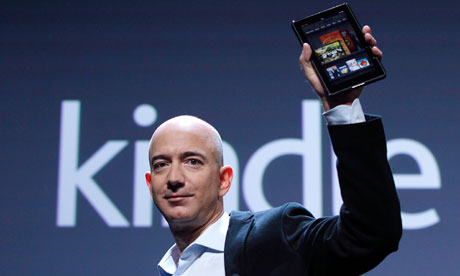Bezos is trying to create an ecosystem that matches Apple but instead of charging a niche price for the products to get people into the Amazon universe, Bezos is letting his products go with little to no margin such as the Kindle line of products. The thought process is that people will begin to use the Kindle and then become so far ingrained that they won't turn back to another product say the iPad.
While Besos may have a long-term view and patience, I'm not sure that Wall Street does.
Via the Economist
- The founder and chief executive of Amazon has often ruffled investors’ feathers by sacrificing short-term profits to make big bets on new technologies that, he insists, will produce richer returns for the company’s shareholders in future. He laid out this philosophy in his first letter to shareholders, penned in 1997, which was entitled “It’s all about the long term”.
- Some of these gambles have paid off handsomely, transforming Amazon from an online retailer of books and other physical products into a technology behemoth with $48 billion of revenues in 2011 and strong positions in fields from cloud computing to tablet devices. They have also enhanced Mr Bezos’s reputation as a technological seer. “In the last few years there has been a re-acceleration of the rate of change in technology,” he says. His impressive ability to identify and profit from the resulting disruptions means he is widely seen as the person best placed to fill the shoes of the late Steve Jobs as the industry’s leading visionary.
- “A big piece of the story we tell ourselves about who we are is that we are willing to invent,” Mr Bezos told shareholders at Amazon’s annual meeting last year. “And very importantly, we are willing to be misunderstood for long periods of time.”
- More recently, financial analysts have grumbled about the company’s wafer-thin margins and the hefty investment it is making in its Kindle range of e-readers, the most advanced of which, the Kindle Fire, is a fully fledged tablet computer. Amazon’s move into hardware with the original Kindle, launched in 2007, was another unexpected move. The devices have proved wildly popular, but Mr Bezos has kept details of sales figures and profitability secret. The assumption is that Amazon is trading short-term profits in order to establish its dominance in the booming e-book market. But nobody really knows. “Investors are paying a lofty premium for a company whose investment cycle is going to extend a decade and which offers limited visibility,” says Colin Gillis of BGC Partners, a brokerage firm.
- “There is room for many winners here,” he says. But he believes Amazon can be one of the biggest thanks to its unique culture and capacity for reinventing itself. Even in its original incarnation as an internet retailer, it pioneered features that have since become commonplace, such as allowing customers to leave reviews of books and other products (a move that shocked literary critics at the time), or using a customer’s past purchasing history to recommend other products, often with astonishing accuracy.
 |
- Amazon’s culture has been deeply influenced by Mr Bezos’s own experiences. A computer-science graduate from Princeton, he returned to his alma mater last year to give a speech to students that provided some fascinating insights into his psychology as an entrepreneur.
- n the 1990s he hesitated to leave a good job in the world of finance to set up Amazon after a colleague he respected advised him against it. But Mr Bezos applied what he calls a “regret minimisation framework”, imagining whether, as an 80-year-old looking back, he would regret the decision not to strike out on his own. He concluded that he would, and with encouragement from his wife he took the plunge as an entrepreneur. They moved from New York to Seattle and he founded the company, in time-honoured fashion for American technology start-ups, in his garage.
- If Amazon does one day move into bricks-and-mortar retail, it would not be the first time that Mr Bezos had taken a leaf from the book of Jobs. Like Apple’s visionary leader, he has a strong sense of showmanship, which was on display at the carefully choreographed launch of the Kindle Fire last year. Mr Bezos can also be an intense and demanding manager. But most importantly, he shares with Mr Jobs an innate understanding of the importance of thinking about high-tech products from the customer’s point of view.
- Similarly, with the Kindle Fire, Mr Bezos recognised that a tablet computer designed chiefly for consuming entertainment content is no use unless there is plenty of such content available. For many other tablet manufacturers, the question of getting content onto their devices seems to be an afterthought; but Amazon, like Apple, has assembled an ecosystem of books, apps, video and music to accompany its device. Moreover, Amazon can use cross-subsidies from the sale of digital content to keep the price of the Fire down, something that rival tablet-makers who do not sell content cannot do. Once again, Mr Bezos is playing a long-term game in the hope of establishing the Fire as the main rival to the iPad.
- Staying on top in the fast-changing world of technology is hard, too. Mr Bezos is bound to be the target of more criticism as his company’s hefty investments in new areas continue to put a dent in its bottom line. His next move could be into smartphones or a video-streaming service that competes with Netflix, but it is just as likely to be something entirely unexpected. By being unusually patient, he hopes to create businesses that rivals will find harder to assail.

No comments:
Post a Comment